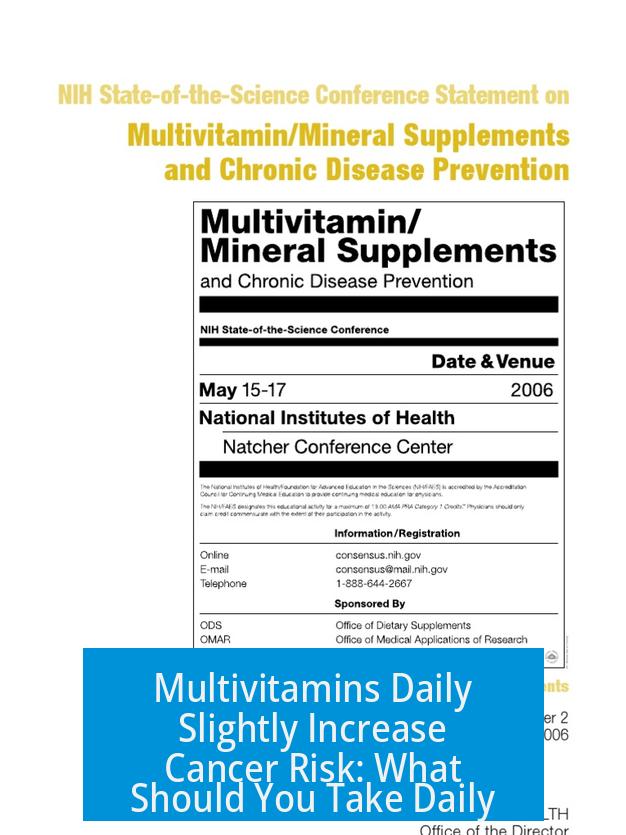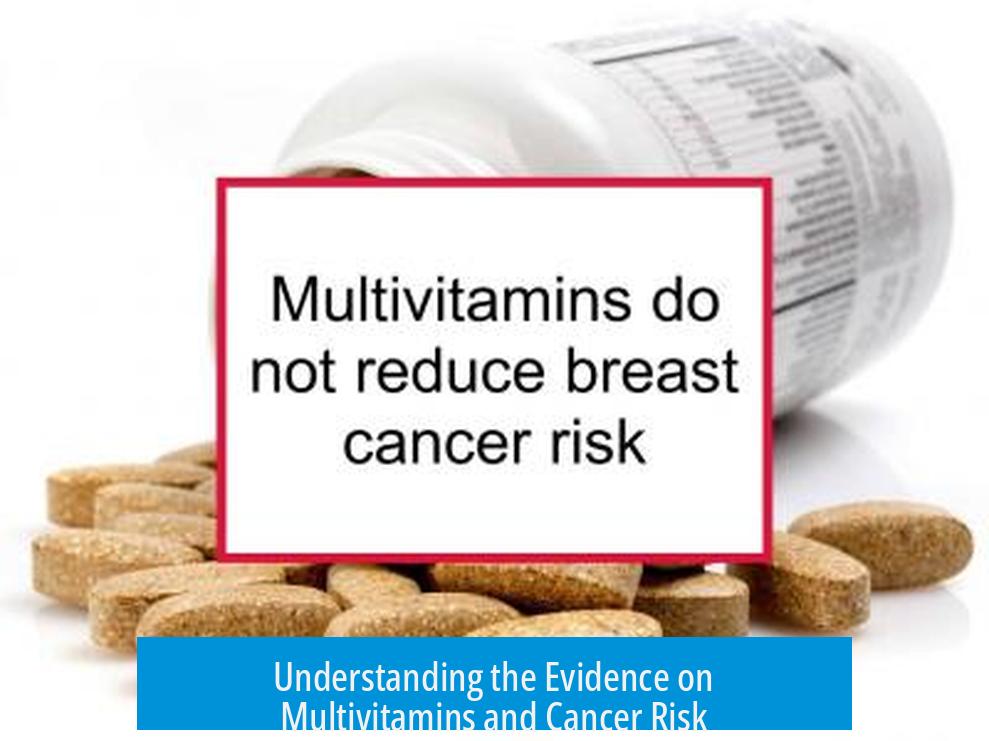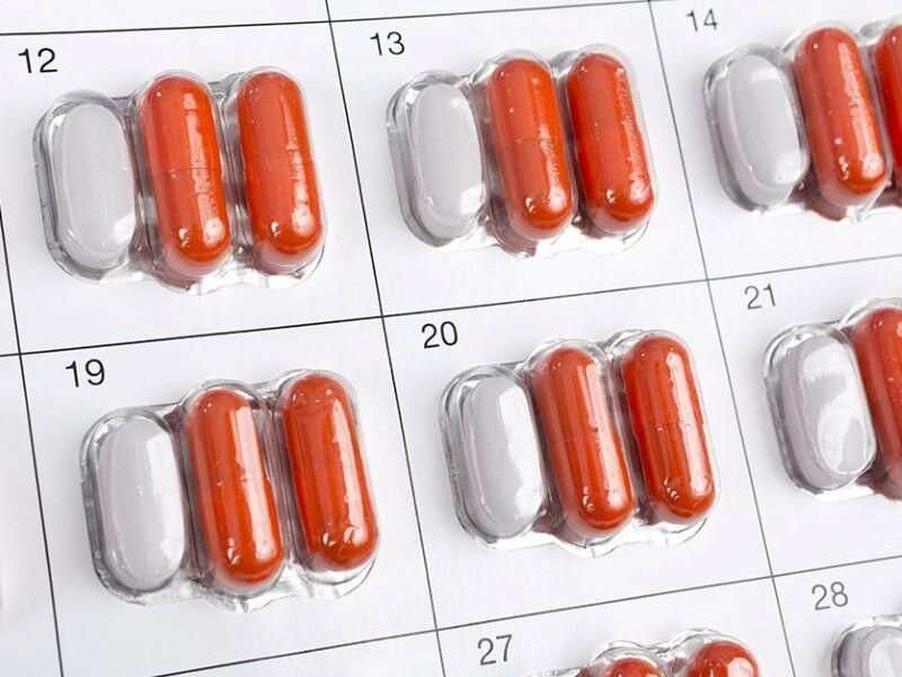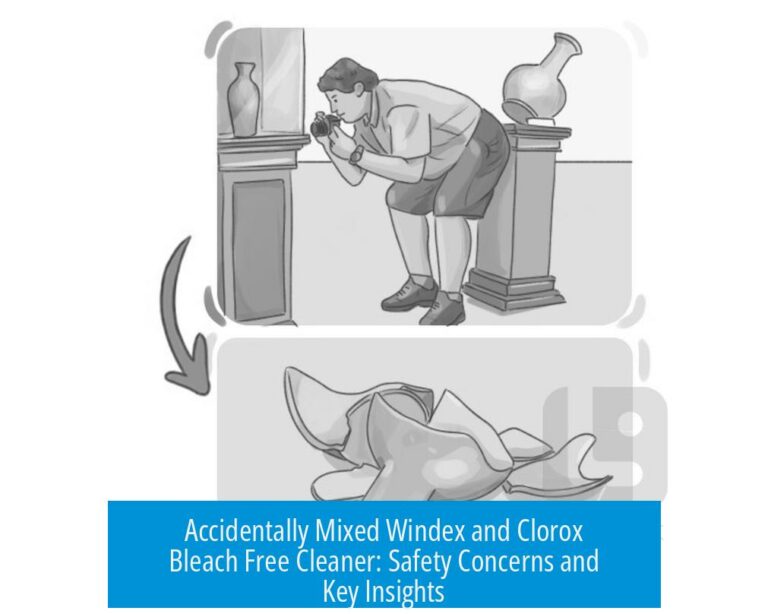Multivitamins Daily Slightly Increase Cancer Risk: What Should You Take Daily?

Daily intake of multivitamins shows, at most, a slight and uncertain increase in cancer risk according to some observational studies. However, the evidence is inconclusive and often challenged due to methodological weaknesses. For most healthy people with balanced diets, routine multivitamin supplementation offers minimal benefit, and the potential risks and costs may outweigh the advantages. Daily vitamin supplementation is most appropriate in cases of diagnosed deficiencies or specific medical recommendations. Prioritizing a nutrient-rich diet and healthy lifestyle generally surpasses the need for multivitamins.
Understanding the Evidence on Multivitamins and Cancer Risk

Some large population studies have suggested a small correlation between daily multivitamin use and increased cancer incidence. However, these findings require careful scrutiny. Most are observational studies that can reveal associations but cannot prove causation.
Limitations in Study Designs

- Reliance on self-reported multivitamin use introduces recall bias and inaccuracies.
- Study populations, such as NIH-AARP cohorts, may not represent the general public due to selection bias.
- Only a subset of cancer cases are captured through selected registries, leading to possible underreporting.
- Studies often fail to monitor changes in supplement habits over time or account for dosages and duration.
- Unmeasured lifestyle or genetic confounders could influence both multivitamin use and cancer risk.
- Results do not necessarily apply to diverse age groups or ethnicities.
Overall, these factors limit the capacity of individual studies to draw definitive conclusions about multivitamins causing cancer.
Biological Hypotheses on Cancer Risk

Some biologists propose that isolated antioxidants in supplements may interfere with natural DNA repair and cellular defense mechanisms. Whole foods contain a complex mix of nutrients and compounds that stimulate endogenous antioxidant production safely. In contrast, synthetic antioxidant isolates might disrupt this balance, theoretically influencing cancer development. However, this remains speculative and unproven.
Views from Toxicology and Supplement Experts

Toxicology experts caution against routine vitamin use without medical indication. Potential concerns include:
- Contamination of supplements with heavy metals.
- Formation of toxic metabolites from excessive vitamin intake.
- Adverse reactions to megadoses of specific vitamins or minerals.
Some recommend only taking supplements prescribed by a healthcare provider to prevent unintended harm.
Who Should Consider Taking Daily Supplements?
Diet-Based Recommendations
A healthy, balanced diet generally meets the nutritional needs of most individuals. Emphasizing vegetables, fruits, lean proteins, whole grains, and healthy fats provides the body with diverse essential nutrients naturally.
People who:
- Have limited dietary variety, such as low vegetable or meat intake.
- Follow vegetarian or vegan diets that might lack vitamin B12 or iodine.
- Live in regions with low sunlight exposure leading to vitamin D deficiency.
- Experience clinically diagnosed deficiencies (iron, calcium, vitamin D, etc.).
may benefit from targeted supplementation after medical evaluation.
Medical Guidance and Personalization
Individual nutritional needs vary widely. A primary care physician or general practitioner can assess personal health status, conduct necessary laboratory tests, and provide tailored recommendations. Referral to dietitians or nutritionists may further support nutritional planning.
Benefits versus Risks of Taking Multivitamins Daily
Minimal Benefit for Well-Nourished Individuals
For people consuming a typical Western diet with no deficiencies, daily multivitamin supplements likely offer no substantiated health benefits. Clinical studies show mixed or negligible effects on preventing chronic diseases or cancer for this group.
Multivitamins in these cases mostly result in excretion of excess vitamins without physiological gain, effectively turning money into urine.
Potential Risks and Costs
- Unproven slight increase in cancer risk remains a concern but is likely overstated.
- Excessive intake of certain vitamins and minerals might provoke toxicity or interfere with bodily processes.
- Financial cost and unnecessary supplement consumption.
Mitigating Risks if Choosing Supplements
For those electing to take multivitamins, some practical steps include:
- Using third-party tested supplements to ensure purity and accurate labeling.
- Splitting doses (e.g., half a pill daily) to reduce excess intake.
- Limiting use to several times per week rather than daily.
- Monitoring for possible interactions with medications.
Other Lifestyle Factors Outweigh Supplementation
Diet quality and lifestyle habits significantly impact health and disease risk more than routine multivitamin use.
- Eating abundant vegetables and limiting red meat correlate with lower cancer risk.
- Avoiding smoking and moderating alcohol intake contribute substantially to disease prevention.
- Regular physical activity supports nutrient metabolism and overall health.
Focus on nutrient-dense food choices surpasses reliance on pills for maintaining wellbeing.
Special Cases and Other Supplements
Certain supplements may provide benefits in specific contexts:
- Vitamin D: Deficiency is common in low-sunlight areas; supplementation can be useful following testing.
- Vitamin B12 and iodine: Important for vegetarians and vegans.
- Iron and calcium: Supplementation may be required if clinical deficiencies exist.
- Creatine: Some athletes benefit from creatine, though it is not essential for general health.
Consult health professionals before starting any targeted supplements.
Key Takeaways
- Evidence that daily multivitamins slightly increase cancer risk is weak and inconclusive.
- Healthy individuals with balanced diets usually do not need multivitamin supplements.
- Supplementation is most appropriate for diagnosed nutrient deficiencies or medical conditions.
- Prioritize a nutrient-rich whole-food diet and healthy lifestyle habits over reliance on supplements.
- If taking multivitamins, choose reputable products, consider lower doses, and consult healthcare providers.
- Personalized medical advice is essential to tailor supplementation to individual needs.
Multivitamins Daily Slightly Increase Cancer Risk? What Should You Take? Does the Benefit Outweigh the Risk?
So, do multivitamins daily slightly increase cancer risk? The short and honest answer: the evidence is shaky, and for most people, the risks are minimal if they exist at all. But whether you should take them daily—and if the benefits outweigh the risks—that’s a trickier question. Let’s break it down.
You’ve probably seen headlines screaming, “Multivitamins May Raise Cancer Risk!” Sounds scary, right? But let’s not jump to conclusions. The studies behind these claims have several flaws.
Is the Cancer Risk from Multivitamins Real or Just Statistical Noise?
One vitamin skeptic said any study finding a tiny link between multivitamins and cancer is probably “baloney.” Why? Because such studies often massage data till that small correlation pokes its head out. This doesn’t scream causation, just a statistical whisper. Plus, many studies rely on self-reported data. Imagine relying on people’s memory about how often they pop a multivitamin years ago—pretty sketchy.
Most of these studies use specific groups, like NIH-AARP participants, who aren’t exactly your average Joe or Jane. This selection bias means the results can’t easily apply to everyone. Also, these studies don’t track how multivitamin use or lifestyle changes over time. So it’s like taking a single snapshot, then trying to guess the whole story.
On top of that, they only check cancer registries in 11 states, missing some cases. So underreporting lurks there. Plus, critical factors—like dosage taken, duration, or even other habits—often slip through unnoticed.
Remember, these are observational studies—they hint at connections but can’t prove your daily vitamin pill is a villain causing cancer.
The Antioxidant Angle: Could Vitamins Backfire?
Some experts, including cellular biologists, worry isolated antioxidants in supplements might backfire. Eating an antioxidant-rich apple differs hugely from swallowing one isolated vitamin C pill. Nature packs whole foods with a mix of compounds that help your body balance itself. Supplements might flood cells with antioxidants, which paradoxically might switch off your body’s natural DNA-protective mechanisms. An unproven theory but one worth considering.
What About Toxic Metals and Toxicology Concerns?
A toxicology professor once advised, “Never take a vitamin or supplement unless prescribed, except possibly iron, calcium, and maybe vitamin E.” The worries include contaminants like heavy metals lurking in supplements or how your body processes mega doses causing toxicity. So safety and manufacturing quality matter.
So, Should You Take Multivitamins Daily?
If you have a well-balanced diet, multivitamins probably don’t add much punch. Most experts agree that a proper diet trumps supplements. Leafy greens, fruits, whole grains, lean proteins, and dairy together cover most vitamin needs.
Imagine spending money to fill vitamin gaps your balanced diet already covers. Not efficient. For typical folks who eat a decent diet, multivitamins mostly turn money into expensive urine.
When Do Multivitamins Make Sense?
If you can’t—or won’t—eat your veggies and proteins, taking a multivitamin can be an okay backup plan. People following a vegetarian or vegan diet often need vitamin B12 and iodine supplements. Those who rarely get sun exposure might require vitamin D supplements, especially during winter.
Similarly, if your doctor diagnoses a specific deficiency—say iron anemia or calcium shortages—then supplementation under medical advice is essential.
Medical professionals, especially your general practitioner or a qualified nutritionist, can personalize advice. They’ll consider your unique health history, diet, and lifestyle before recommending supplements. So your best bet? Ask your doctor.
But What If You Still Want to Take a Multivitamin?
Feel like multivitamins give peace of mind? No judgment. Just consider smaller doses. One clever tip from the trenches: break the pill in half and take half a pill daily. You still get most nutrients, but with fewer excess vitamins flooding your system.
Also, choose multivitamins that are third-party tested. This reduces the risk of heavy metals, contaminants, or mislabeling—less shady stuff in your capsule.
Frequency and Type Matter Too
Some people only take multivitamins once or twice a week. For instance, vegetarians might grab ones fortified with iron, B12, and iodine to complement their diet. This sporadic use might balance nutrient topping without constant excess. But keep in mind, most benefits come from consistent, balanced eating habits rather than supplements alone.
Does the Benefit of Daily Multivitamins Outweigh the Risk?
Given all this, does the benefit outweigh the small, hypothetical risk? For average people without diagnosed deficiencies, probably not. The multivitamin industry thrives on the idea people need supplements to optimize life—better sleep, sharper focus, enhanced energy. But nutrition science is complex and often unclear. Sometimes, the simplest advice wins: eat real food. Your cells and DNA prefer it that way.
For most, daily multivitamins are like a money pit leading to pricey pee. It’s a convenient placebo, but not a health must-have. Risks are subtle or theoretical. Real dangers like smoking, heavy drinking, poor diet, or inactivity will dwarf multivitamin risk by far.
Consider Lifestyle and Diet First
Healthy lifestyle choices trump pills. Focus on mostly vegetables, modest lean meats or equivalents, minimal red meat, no smoking, and moderate alcohol. These changes impact overall health far more than popping a multivitamin daily.
Other Supplements With Clearer Benefits?
If you’re into fitness or sports, creatine offers noticeable benefits for muscle and strength. But it’s not necessary for everyone and doesn’t replace a varied diet.
Practical Takeaways
- If you eat a balanced diet, multivitamins add little. Avoid spending piles on them.
- Get tested if worried about vitamin D, B12, or iron deficiency. Supplement only if doctors advise.
- Don’t trust headlines claiming multivitamins cause cancer outright. The evidence is inconclusive and flawed.
- Choose supplements wisely—third-party tested products and smaller doses reduce risks.
- Consult your doctor for personalized guidance rather than self-prescribing supplements.
- Focus on whole foods. The synergy of nutrients in real food can’t be matched by pills.
Final Thoughts
Daily multivitamins might have a tiny risk or no risk at all regarding cancer. For most, the risk is not enough to outweigh the benefits of a nutrient-rich diet. Supplements do have their place but aren’t magic bullets. True health starts with a balanced diet, regular exercise, and sensible lifestyle choices. Vitamins can support but never replace that foundation.
Curious about your nutritional status? Don’t Google endlessly—talk to your healthcare provider. Their advice beats any headline every day of the week.
Eat well, move often, and enjoy your veggies. Your future self will thank you—even if it’s just for sparing you some urine-expensive vitamins!
Does taking multivitamins daily really increase cancer risk?
The evidence is uncertain. Studies showing a slight cancer risk link often rely on flawed data and do not prove cause. Many experts remain skeptical about this correlation.
Should I take a daily multivitamin if I feel healthy?
If you have no vitamin deficiency, a balanced diet is usually enough. Daily multivitamins might not offer extra benefit and could be unnecessary.
When is it justified to take multivitamins or supplements?
Supplements are useful if you have specific deficiencies, dietary restrictions, or a doctor’s recommendation. Common examples include vitamin D, B12 for vegetarians, iron, and calcium.
What precautions should I take if I choose to use multivitamins?
Choose third-party tested products. Consider taking smaller doses, like half a pill, to reduce excess intake. Consult your doctor before starting any supplement.
Do the benefits of daily multivitamins outweigh the risks?
For most healthy adults, the risks or costs often outweigh benefits. Without medical need, daily multivitamins may be unnecessary and provide little advantage.





Leave a Comment